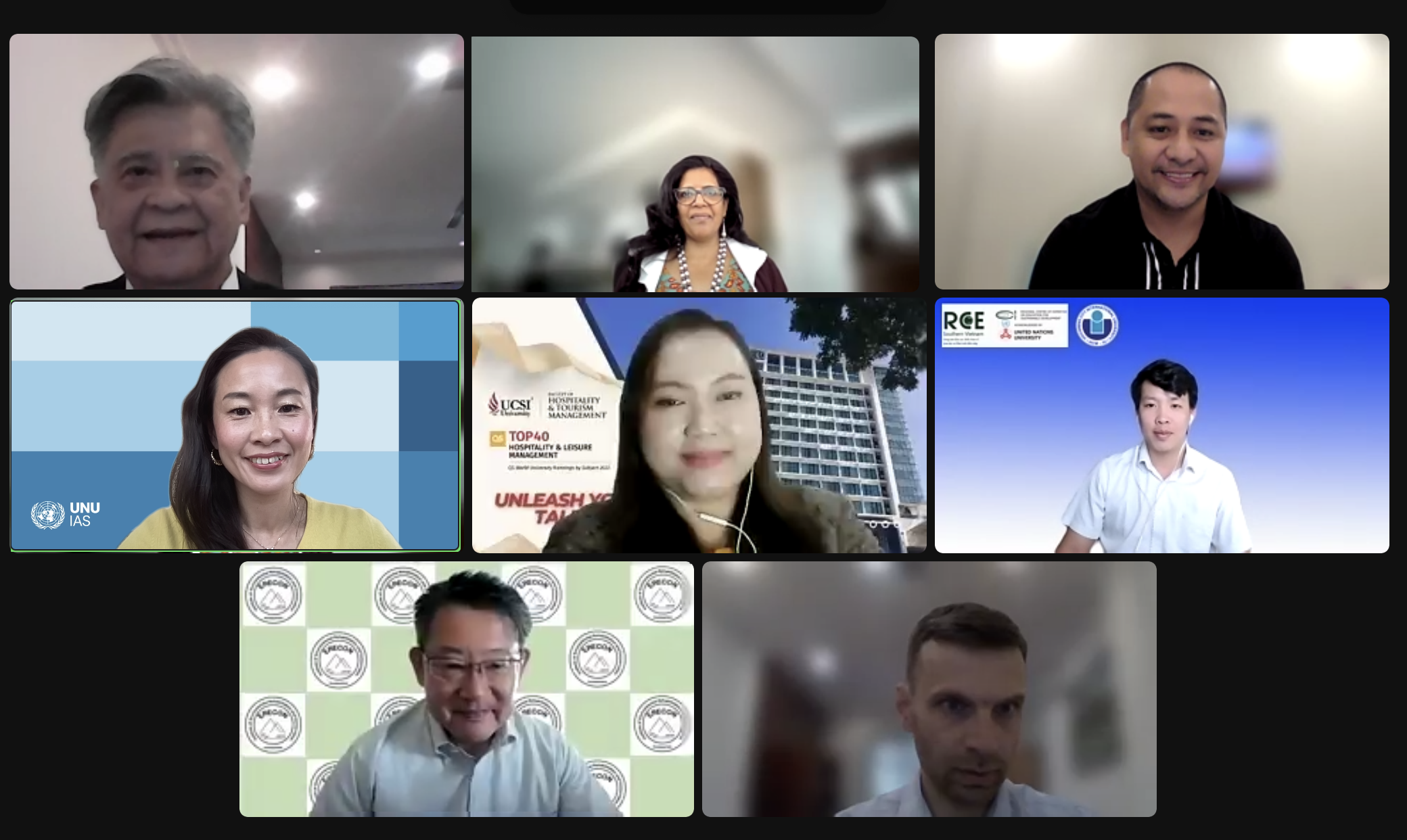 On 4 March 2023, UNU-IAS organised a special session at the 14th International Conference on Environmental and Rural Development (ICERD) in a hybrid mode. Under the theme ‘Circular Economy Education for Sustainable Development in Local Communities‘, this event explored the role of education, multi-stakeholder partnerships, and community engagement in addressing local problems, focusing on the promotion and practice of the circular economy model.
On 4 March 2023, UNU-IAS organised a special session at the 14th International Conference on Environmental and Rural Development (ICERD) in a hybrid mode. Under the theme ‘Circular Economy Education for Sustainable Development in Local Communities‘, this event explored the role of education, multi-stakeholder partnerships, and community engagement in addressing local problems, focusing on the promotion and practice of the circular economy model.
The session was chaired by Prof. Mario Tabucanon (Visiting Professor, UNU-IAS) and co-chaired by Mr. Ognen Onchevski (Institute of Environmental Rehabilitation and Conservation). Ms. Miki Konishi (Programme Coordinator, UNU-IAS) gave an overview of Regional Centres of Expertise on Education for Sustainable Development (RCEs), where she introduced two projects conducted by RCEs in Africa to promote a circular economy, contributing to achieving multiple Sustainable Development Goals (SDGs), particularly Goal 12 (Sustainable Consumption and Production).
A keynote presentation by Prof. Usha Iyer-Raniga (Professor, RMIT University) introduced outputs from the ongoing ProSPER.Net Joint Research Project on circular economy education in the built environment undertaken in five countries in the Asia-Pacific region. She highlighted the significant impact of the building and construction sector, the importance of closing the loop of the value chain, and the necessity of implementing multiple R-principles in the built environment to create more incentives and benefits for the building and construction industry. Prof. Usha stressed that there is no one-fits-all approach for practising the circular economy, and emphasised the importance of contextualisation to find optimal ways to apply the practices learned from the various case studies.
Three RCEs then shared their projects promoting circular economy in their respective localities. Dr. Sherrymina Anak Kichin (RCE Kuching, Malaysia) spoke about the 5Rs (Refuse, Reduce, Reuse, Recycle, Re-purpose) campaign for sustainable waste management. The project has encouraged students living along the Sarawak Kiri River to participate in river conservation efforts through the 5Rs proactively, with 172 students having participated in the project to promote waste management in their schools and local communities. Mr. Hoang Nhat Truong (RCE Southern Vietnam, Viet Nam) introduced their initiative of capacity building for farm owners to promote organic farming in the Southeast region of Vietnam, the biggest agricultural production area in the country. However, intensive cultivation dependent on synthetic fertilizer and pesticides has led to environmental degradation. Therefore, the RCE started the project to ensure the long-term benefit of both people and nature, which started with compiling a comprehensive database, evaluating the current practice, developing the training materials and providing workshops for farmers to gain knowledge on organic farming practices. As a result, over 300 farmers have been trained at the model farm. Dr. Charlie Batin (RCE Ilocos, the Philippines) presented their project on bamboo production, rehabilitation, and processing, which engages the community in collaboration with the university, local government, units in Ilocos Norte, bamboo manufacturers and processors and technical experts from the Mariano Marcos State University. Bamboo farmers are trained on various bamboo technologies such as bamboo production, management, rehabilitation and processing to produce quality bamboo poles as sources of food through its shoots, livelihood opportunity, and for environmental protection. As a result, the initiative contributed to increasing income, creating employment in the community, and promoting a bio-circular-green economy.
Reflecting on the challenges and obstacles in empowering learning and actions for promoting a circular economy, RCE Kuching noted the effect of the COVID-19 pandemic, which halted the projects at schools, as well as budget constraints to develop them. RCE Southern Vietnam faced obstacles in promoting organic agriculture due to lack of farmers’ awareness of the benefits and hesitance to change their practices, as well as limited access to resources such as organic fertilizers. Showing successful cases of the pilot farmers motivated other farmers to apply sustainable agricultural models. In the case of RCE Ilocos, the region is rich in natural bamboos, however they were not often used. Capacity-building activities were key for the community to recognise the value of bamboo as an important resource for income generation and in turn to create sustainable communities.
Concluding the session, Prof. Tabucanon reiterated the importance of RCEs as the local and regional vehicle to respond to problems toward sustainable transformation through networks, partnerships and collaboration. He also highlighted that capacity development and empowerment of people through problem-based education can play a crucial role in promoting the circular economy model for sustainable development. The three RCE case studies demonstrated innovative leadership on ESD at the local and regional levels, association of RCE activities with the SDGs and ESD framework, and expansion of knowledge sharing and outreach involving multi-stakeholders.
